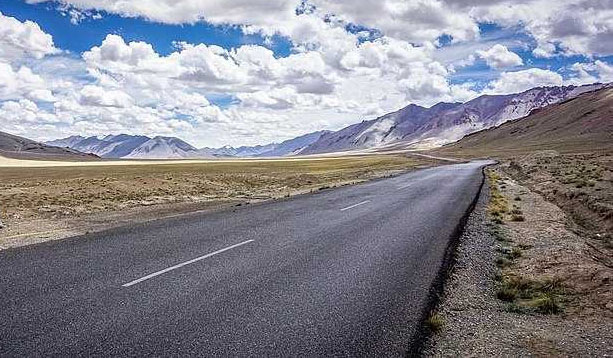Significant steps taken to prevent damage to fragile environ
* For first time, recycling unit established in Leh
Mohinder Verma
JAMMU, Oct 21: Stating that significant steps have been taken to prevent further damage to the fragile environment in the cold desert region, the Administration of Union Territory of Ladakh has informed the National Green Tribunal (NGT) that Border Roads Organization (BRO) is using plastic waste in the construction of roads while as for the first time recycling unit has been established in Leh thereby reducing transportation costs and promoting the circular economy.
Follow the Daily Excelsior channel on WhatsApp
While taking serious note of revelations that mountains of plastic are chocking the Himalayan areas, the National Green Tribunal had sought response from all the Himalayan States and Union Territory of Ladakh.
In the response submitted to the Tribunal, B.M Sharma, Member Secretary, Ladakh Pollution Control Committee has mentioned that in the Union Territory of Ladakh significant steps have been taken by the administration to address solid waste management issues including plastic waste.
“The region has adopted innovative methods such as using plastic waste in road construction and about five tonnes of plastic wastes have been used in road construction by the Border Roads Organization (BRO) after signing a Memorandum of Understanding (MoU) between Administration of Union Territory of Ladakh and Project Himank”, he submitted.
Initially, the collected plastic waste was being sent to recycling units outside UT of Ladakh. However, this year, a plastic recycling unit has been established—M/s Ladakh Recycling Solution at Nimoo Thang-Leh with total capacity of 2 tonnes per day to treat and recycle the plastic waste for the manufacturing of plastic tiles and plastic furniture.
“The unit holder has already been supplied with 21.65 tonnes of plastic waste by the Municipal Committee Leh ending August 2024. This development is a significant step toward ensuring that plastic waste is managed more sustainably within the region thereby reducing transportation costs and promoting the circular economy”, the Pollution Control Committee said.
It has further been submitted that in urban areas including Leh and Kargil cities, the solid waste including plastic waste is being managed by the respective Municipal Committees while as in rural areas, the Project Tsangda initiated by the Ladakh Autonomous Hill Development Council (LAHDC) in association with the Department of Rural Development, has been actively managing solid/plastic waste.
“The project aims to collect plastic waste from every rural area/household and bring it to designated processing facilities. Both the Municipal Committees and Project Tsangda are tasked with the collection, segregation and disposal of solid/plastic waste as per the Solid Waste Management Rules, 2016”, the Member Secretary said.
He further said that despite the challenging terrain and logistical issues, both Municipal Committees of Leh and Kargil and the Project Tsangda are making their best efforts to support the environmental sustainability of Ladakh and prevent further damage to fragile ecosystem of this region.
Moreover, efforts have been made to ensure scientific disposal of plastic waste as per the Plastic Waste Management Rules, 2016 with a focus on reducing plastic waste pollution and promoting recycling wherever possible.
Further, to foster sustainability and reduce the environmental footprint of plastic waste in the region, the Women Alliance of Ladakh (WAL), a prominent local Non-Governmental Organisation (NGO) played a pioneering role in self-imposing ban on plastic carry bags in 1998 before the notification of Plastic Waste Management Rules in 2016.
“The UT of Ladakh also imposed ban on Single Use Plastic (SUP) with effect from August-2021 with the amendments made in the Plastic Waste Management Rules, 2016 which is being strictly enforced”, the Pollution Control Committee said.
It is pertinent to mention here that micro-plastics can be trapped in glaciers for a long time and released into rivers during snow melting. Moreover, unscientific plastic disposal can cause soil and water pollution in the Himalayan Region and impacting its biodiversity, which is having an adverse impact on the fresh water sources.
The rapid and unplanned urbanization and changing production and consumption patterns are responsible for the plastic waste generation and quantum jump in tourist footfall is another reason for exacerbation of the problem.


